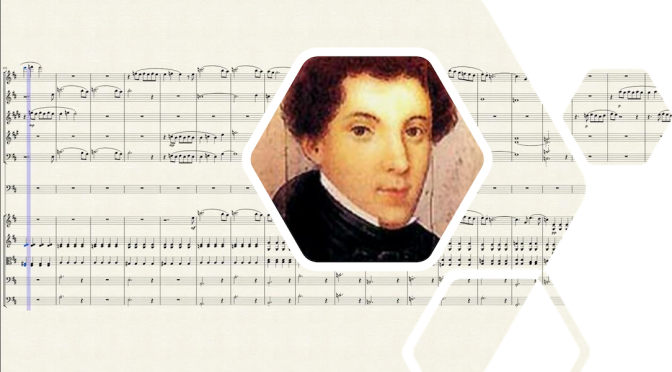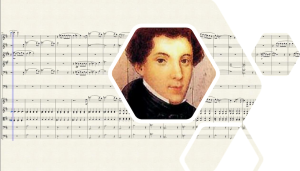When a budding genius dies young, one wonders “what if” they had lived longer, what could they have accomplished? Juan Crisóstomo Arriaga, though not even reaching his 20th birthday, displayed such musical genius that he was often compared to Mozart. His teachers praised him for his deep understanding of composition and harmony, despite the fact that he had not been formally instructed in either when he wrote many of his works. Yesterday marked the 218th anniversary of his birth, and one can only speculate what he might have accomplished if he had made it to 40 or 50 or even longer.
- Juan Crisóstomo Arriaga was born in Bilbo on January 27, 1806, fifty years to the day after Mozart, one of the multiple reasons he was nicknamed the “Spanish Mozart.” His father, Juan Simón, originally from Errigoiti, had moved to Bilbo from Gernika in 1804 and had displayed some musical talent of his own – he had been an organist. Living and working in Bilbo, he was able to provide for his future son’s much more prodigious talent. Arriaga’s mother, María Rosa Catalina de Balzola, was from Gernika. Arriaga was the eighth of nine children born into the family.
- The name Arriaga comes from a small hamlet near Gernika, and means place of stone.
- Arriaga was a musical prodigy. He wrote his first octet, Nada y Mucho, when he was eleven years old. He wrote an overture when he was twelve and, by his fourteenth birthday, he had written the two-act opera Los esclavos felices (The Happy Slaves), his Variation for strings, and La Húngara for violin and piano.
- At the age of 15, his dad arranged his move to Paris to complete his musical studies – he would never see his family again. There, he studied violin with Pierre Baillot, counterpoint with Luigi Cherubini, and harmony under François-Joseph Fétis, all at the Paris Conservatoire. When he was 18, Fétis made him a teaching assistant.
- One of his first compositions while in Paris was his Arco Quartets, of which Fétis said “It is impossible to find anything more original, nor more purely and correctly written.” He also wrote his Symphony in D for Large Orchestra and several other vocal pieces to be accompanied by orchestra. He was particularly praised by his instructors for his “sophisticated harmonies, counterpoint and fugue,” all this despite relatively little formal training. Cherubini called him “the very personification of music.”
- Unfortunately, Arriaga’s brilliance was cut short. He died just short of his twentieth birthday on January 17, 1826, from a lung ailment, possibly tuberculosis or fatigue as a consequence of overexertion due to his meteoric trajectory. Upon his death, a trunk with his violin and some of his manuscripts was sent to his father’s house in Bilbo. It was left in an attic where it remained abandoned for years until it was rescued, almost half a century later, by a relative in 1869.
- The Teatro Arriaga in Bilbo, which opened in 1890, was named after the famed composer in 1902.
- You can find a playlist of some of his compositions – many have been lost to time – on Youtube.
Primary sources: Sagardia Sagardia, Ángel. Arriaga, Juan Crisóstomo (1806-1826). Auñamendi Encyclopedia, 2024. Available at: https://aunamendi.eusko-ikaskuntza.eus/en/arriaga-juan-crisostomo-1806-1826/ar-4933/; Juan Crisóstomo Arriaga, Wikipedia; Juan Crisóstomo de Arriaga, Wikipedia
Discover more from Buber's Basque Page
Subscribe to get the latest posts sent to your email.



